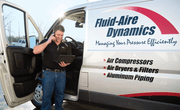When it comes to choosing the right air compressor for your industrial needs, the direct drive vs. belt drive compressor decision can be a crucial one. Both options have their advantages, and knowing which one is better suited for your specific application is essential. In this blog post, we will explore the pros and cons of direct-drive and belt-driven air compressors, helping you make an informed decision that aligns with your requirements. Whether you prioritize efficiency, cost-effectiveness, or flexibility, we'll delve into the factors to consider when choosing the best industrial air compressor for your needs.
What Is a Direct-Drive Air Compressor?

A direct-driven air compressor is a type of compressed air system where the compressor pump is coupled directly to the drive motor without any belts, gears, or pulleys. Both reciprocating air compressors and rotary-screw air compressors can utilize direct drive systems. This contrasts with belt drive compressors, where the pump and motor are connected via a belt and pulleys. Direct drive compressors benefit from increased efficiency, reduced maintenance, and lower noise compared to belt drive systems. The direct coupling enables full motor output to be transferred to the pump, maximizing compression performance. Direct drive systems are a popular choice for industrial and commercial air compressor applications. Most air compressors over 50 HP are direct-drive.
What Is a Belt-Drive Air Compressor?

A belt-driven air compressor is a type of compressor that uses a belt and pulley system to transfer power from the motor to the compressor pump. This design allows for variable speed control and flexibility in adjusting the compressor's performance. Belt-driven air compressors typically have a higher maximum pressure (PSI) as compared to direct-drive compressors, making them suitable for applications that need higher pressure such as tires and maintenance applications. Most piston air compressors are belt drive.
Belt Drive vs. Direct Drive Air Compressor: A Comparative Analysis
There are several factors to consider when choosing between a direct-drive vs. belt-drive compressor, including your usage patterns, available budget, energy costs, the usage environment and your maintenance capabilities. Keep in mind that rotary screw compressors are more likely to be direct drive (especially at higher horsepower), while most piston compressors are belt-driven.
1. Air Usage
When comparing belt drive vs. direct drive air compressors for air usage, it's important to consider your specific needs and application requirements.
- Direct drive air compressors are well-suited for high-CFM applications where a consistent and powerful airflow is essential. They offer a direct connection between the motor and compressor, resulting in efficient and reliable performance.
- On the other hand, if you anticipate the need for adjustable performance or have varying air demands, a belt-driven compressor may be the better choice. With the ability to modify performance settings, belt-driven compressors provide flexibility and adaptability for different air usage needs.
More flexible: Belt-drive compressor.
2. Available Budget
When considering the available budget for a new air compressor, it's important to weigh the pros and cons of belt drive vs. direct drive options.
- While belt drive air compressors are often more affordable up front, direct drive compressors may provide long-term cost savings. Direct driven compressors are known for their superior efficiency and lower maintenance and can result in lower electricity usage and energy costs over time.
- However, if upfront cost is a primary concern and you have simpler air usage requirements, a belt drive compressor may be the more economical choice. It's essential to evaluate your budget and long-term operating costs when deciding between direct drive and belt drive air compressors.
More budget-friendly: Direct-drive compressor.
3. Air Compressor Efficiency
When comparing belt drive vs direct drive air compressors, one important factor to consider is air compressor efficiency.
- If efficiency is important, direct-drive wins hands down. This is because power is transferred more efficiently through the drive mechanism than with a belt and pulley system. Even when a belt-drive compressor is calibrated perfectly, some energy is lost to friction, heat and “belt slip.” Higher efficiency translates to lower energy costs for a direct-drive compressor.
More efficient: Direct-drive compressor.
4. Environment of Usage
When selecting an air compressor drive type, consider the environment it will operate in.
- Belt drive systems can be impacted by harsh environments with temperature extremes, humidity, salt or corrosive chemicals. The belts and external moving parts are more exposed to elemental damage.
- With fewer exposed components, direct drive systems withstand environmental factors and contaminants better. For optimal durability in demanding conditions, a rotary screw direct drive air compressor is recommended.
More reliable: Direct-drive compressor.
#5. Maintenance
- When it comes to maintenance, direct drive air compressors have an advantage over belt drive systems. With fewer moving parts like belts, there is less wear and tear. Direct drive systems require less air compressor preventive maintenance, needing only regular service of the air end, electric motor, and filters. The minimal maintenance of a direct drive allows for sustained peak performance and compressor reliability. Overall, the straightforward design translates to lower operating costs.
- Belt drive systems have more components requiring inspection, adjustment and replacement when worn. This can lead to increased downtime. However, they may be easier for your maintenance team to service in house.
Easier to maintain: Direct-drive compressor.
6. Environmental Impact
When considering the environmental impact of air compressors, it's important to compare the eco-friendliness of belt drive vs. direct drive systems.
- Direct drive air compressors, with their direct connection between the motor and compressor, generally offer greater energy efficiency. This means they consume less electricity and produce fewer greenhouse gas emissions compared to belt driven models. Additionally, direct drive systems reduce the need for additional components, resulting in less waste and a smaller environmental footprint. By choosing a direct drive air compressor, you can not only save on energy costs but also contribute to a greener and more sustainable future.
More eco-friendly: Direct-drive compressor.
#7. Noise Level
Air compressor noise levels are another consideration when selecting an air compressor drive type.
- Direct drive systems operate more quietly than belt drive compressors. The direct coupling minimizes noise from the motor turns and air flow. Lubricated rotary screw compressors also run more quietly than oil-free types.
- Belt drives can experience misalignment and vibration leading to increased noise.
- Location, unit sizing and piping connections are a few other factors that contribute to noise. For reduced sound levels, direct drive rotary screw compressors are the optimal choice, especially for noise-sensitive applications due to compressor speed.
Less noisy: Direct-drive compressor.

Conclusion: Choosing Between Direct-Drive and Belt-Drive Compressors
When selecting an industrial air compressor over 50 HP, a direct drive system often makes the most sense. Direct drive compressors provide reliability, efficiency, and lower maintenance costs — important factors for large-scale compressed air demands. Fluid-Aire Dynamics, the leading compressed air equipment provider, specializes in premium rotary screw direct drive air compressors. With expertise in system sizing for optimal efficiency, Fluid-Aire's experienced technicians can recommend the best drive type and compressor design for your specific application. Contact us today to learn more about the benefits of a direct drive compressor for your needs.




